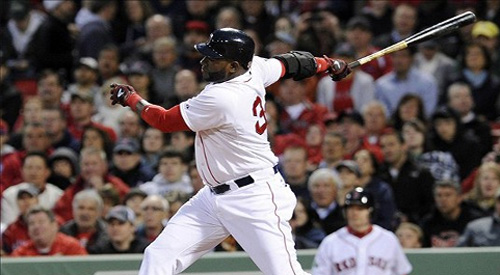
The Fenway Monster
David Ortiz isn’t what he used to be.
He was apparently older than the age he’d listed and he couldn’t catch up to inside fastballs or outside changeups. A slow pitch softballer could have thrown three by him. The man who had hit a walk-off homerun in game four of the 2004 ALCS and a walk-off single in game five to lead the Red Sox to a World Series win was nothing but a rather large shadow.
In 2009, after 34 games, he was hitting .206 with no long balls. He went 178 at-bats without a home run.
He was done.
The media was convinced. Fans were certain. The man they would always love was fading away before their eyes, like a dying grandparent. We’ll always love you Papi, but if you can’t hit then it really would be better if we found you a nice home.
Ortiz was listening and he was planning something special. In his 179th at-bat, Brett Cecil threw him one he could handle and David sent it over the centerfield wall in Fenway. He finished the year putting 28 over the fence.
He wasn’t done.
[php snippet=1]
In 2010, he hit 32 home runs to go with a .270 batting average. Fans were hopeful but realists suggested an aberration. That Papi’s declining numbers and slow starts suggested an unstoppable decay that would result in his departure from the game. Like Jim Rice during his decline, the best times were behind him and there was nowhere to go but down.
But he wasn’t done. They were right about the aberration, but not in the way they thought. Papi’s 2010 season wasn’t a last hurrah, it was a warning shot.
In 2011, he surpassed expectations and put up 4.2 WAR; his highest total since 2007. He finished the year with a .309 average and a .398 OBP to go with 29 bombs. The surprising factor in his resurgence wasn’t just a restoration of Papi-like numbers, but his newest approach to left-handed pitchers.
From 2008-2010 his highest batting average against lefties was .222. In 2011, Papi learned to appreciate the southpaw and went on to hit them for a .329 average. And if Papi was just learning to hit lefties in 2011, then he’s now writing the book on it. His current average against lefties is .448; almost 100 points higher than his average against righties (a still sky-high .365).
In 2012, he might be in the midst of his best season since 2007.
The man is locked in. He’s being aggressive in the box which has led to a slight dip in his walk numbers: in his career he’s walked in 13.1 percent of his plate appearances whereas in 2012 he’s at 8.8 percent. The dip in walk-rate can be an alarm bell for some players, but usually when paired with a spike in strike out rate. Papi’s on track to post a career best 12.7 percent strike out percentage (in his career he’s struck out in 18.8 percent of plate appearances). The man is locked in and raking.
He’s posting his best power numbers since 2006 when he broke the Red Sox home run record held by Jimmie Foxx. He’s hitting for more power than he has in years and that power isn’t costing him with more strike outs. All thoughts of a Jim Rice career collapse have vanished. With his fifth home run of the year Ortiz surpassed Rice’s home run total of 382. He’s long since passed Edgar Martinez’s total of 309 and while Martinez deservers the moniker of greatest designated hitter, David isn’t far behind (Martinez’s WAR: 69.9. Ortiz’s: 37.1).
Recently the designated hitter position had been trending toward more of a rest-stop for injury-prone players. But Ortiz is proving that a great hitter in the DH role is a worthwhile luxury. While the Red Sox pitching struggles, he’s the best hitter on a powerful offense which has kept the team in the race.
If management had provided a few more pitching pieces, then fears of a Red Sox downfall would vanish because Papi would be on the best team in the majors. But unless he develops a wicked knuckleball (might be worth calling Wakefield) he’ll just have to continue to be a force at the plate. And the best news for Red Sox fans?
He’s not done.
David Ortiz isn’t what he used to be.
[php snippet=1]

